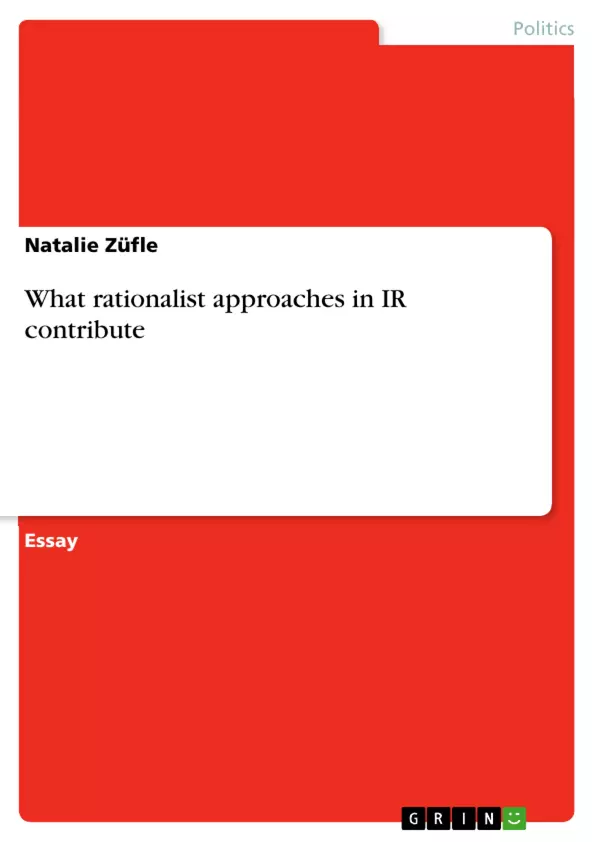Rationalist approaches have definitely contributed very valuable perspectives on different topics. But this school also mirrors some shortcomings – in particular with regard to the profoundly changed world order since the end of Cold War that gave among others rise to new powerful actors and novel issues.
Our world can be seen through different lenses, and it depends on the prevailing view, which theory should be applied best and most appropriately (see also Mingst 2004, p. 80). If the pros or rather the cons of rationalist paradigms outweigh hinges therefore also largely on the question that one asks about a certain phenomenon.
Inhaltsverzeichnis (Table of Contents)
- Research Question
- What rationalist approaches in IR contribute
- Methodology/Epistemology
- Ontology Neorealism
Zielsetzung und Themenschwerpunkte (Objectives and Key Themes)
The objective of this paper is to critically analyze the contribution of rationalist approaches to the study of International Relations, illustrating their strengths and weaknesses. The focus is on neorealism and neoliberalism.
- Strengths and weaknesses of rationalist approaches in IR
- Methodology and epistemology of neorealism and neoliberalism
- Ontology of neorealism, particularly Waltz's structural theory
- Rational choice theory and its application in IR
- Comparison of rationalist and non-rationalist approaches
Zusammenfassung der Kapitel (Chapter Summaries)
Research Question: This section introduces the central research question: a critical analysis of the contributions rationalist approaches make to the study of International Relations, focusing on the strengths and weaknesses of this approach. It sets the stage for the subsequent exploration of neorealism and neoliberalism within the broader context of rationalist thought in IR theory.
What rationalist approaches in IR contribute: This section introduces the concept of rationalism in IR, defining it as actions of decision-making entities making choices rationally based on preferences and constraints, aiming to maximize benefits and minimize losses. It establishes the framework for examining the strengths and limitations of rationalist approaches in understanding international relations, paving the way for a deeper analysis of neorealism and neoliberalism in subsequent sections.
Methodology/Epistemology: This chapter delves into the methodological and epistemological foundations of neorealism and neoliberalism, highlighting their adherence to the positivist tradition. It emphasizes the use of scientific methods, data collection, and the identification of general laws and patterns of behavior to explain and predict international phenomena. The section underscores the importance of quantitative methods, falsifiable hypotheses, and the pursuit of objective knowledge in understanding IR, contrasting it with approaches that incorporate non-measurable factors.
Ontology Neorealism: This chapter focuses on the ontological aspects of neorealism, specifically Waltz's structural theory. It contrasts neorealism with classical realism, noting the sometimes contradictory position of classical realism towards rationality. The chapter emphasizes Waltz's parsimonious model, which focuses on the structure of the international system and its impact on state behavior, especially the drive for survival and the principle of self-help. The section highlights the application and lasting relevance of neorealism, particularly its ability to explain systemic phenomena and address core questions in international relations.
Schlüsselwörter (Keywords)
Rationalism, Neorealism, Neoliberalism, International Relations Theory, Rational Choice Theory, Positivism, Methodology, Epistemology, Ontology, Waltz, State Behavior, Anarchy, Self-Help, Power, Cooperation, Conflict.
FAQ: Comprehensive Language Preview of Rationalist Approaches in International Relations
What is the main objective of this paper?
The paper critically analyzes the contribution of rationalist approaches (specifically neorealism and neoliberalism) to the study of International Relations, highlighting their strengths and weaknesses.
What are the key themes explored in this paper?
Key themes include the strengths and weaknesses of rationalist approaches in IR; the methodology and epistemology of neorealism and neoliberalism; the ontology of neorealism, particularly Waltz's structural theory; rational choice theory and its application in IR; and a comparison of rationalist and non-rationalist approaches.
What is covered in the "Research Question" section?
This section introduces the central research question: a critical analysis of the contributions rationalist approaches make to the study of International Relations, focusing on the strengths and weaknesses of this approach. It sets the stage for the subsequent exploration of neorealism and neoliberalism.
What does the section on "What rationalist approaches in IR contribute" discuss?
This section defines rationalism in IR as actions of decision-making entities making choices rationally based on preferences and constraints to maximize benefits and minimize losses. It establishes the framework for examining the strengths and limitations of rationalist approaches in understanding international relations.
What is the focus of the "Methodology/Epistemology" chapter?
This chapter explores the methodological and epistemological foundations of neorealism and neoliberalism, emphasizing their adherence to the positivist tradition, the use of scientific methods, and the pursuit of objective knowledge in understanding IR.
What is discussed in the "Ontology Neorealism" chapter?
This chapter focuses on the ontological aspects of neorealism, specifically Waltz's structural theory. It contrasts neorealism with classical realism and highlights Waltz's parsimonious model, focusing on the structure of the international system and its impact on state behavior.
What are the key keywords associated with this paper?
Key words include: Rationalism, Neorealism, Neoliberalism, International Relations Theory, Rational Choice Theory, Positivism, Methodology, Epistemology, Ontology, Waltz, State Behavior, Anarchy, Self-Help, Power, Cooperation, Conflict.
What specific rationalist approaches are analyzed?
The paper focuses primarily on neorealism and neoliberalism.
What is the overall approach of the paper?
The paper employs a critical analysis approach, evaluating both the strengths and weaknesses of rationalist perspectives in International Relations theory.
What type of methodology is emphasized in the paper?
The paper emphasizes a positivist methodology, focusing on scientific methods, data collection, and the identification of general laws and patterns of behavior.
- Citar trabajo
- Natalie Züfle (Autor), 2008, What rationalist approaches in IR contribute, Múnich, GRIN Verlag, https://www.grin.com/document/180087



